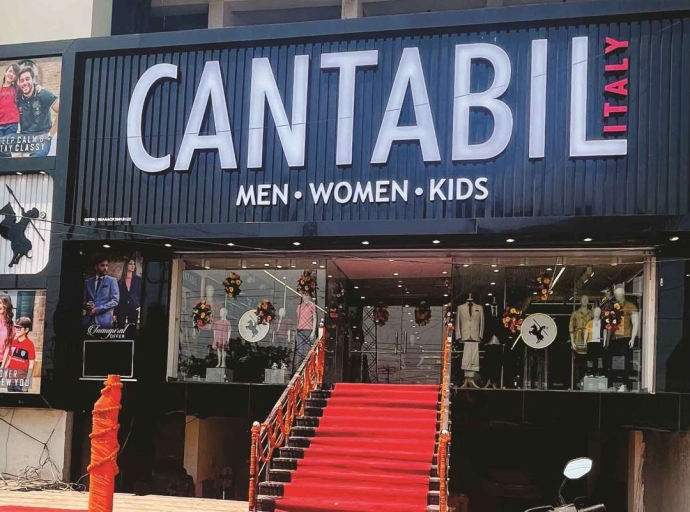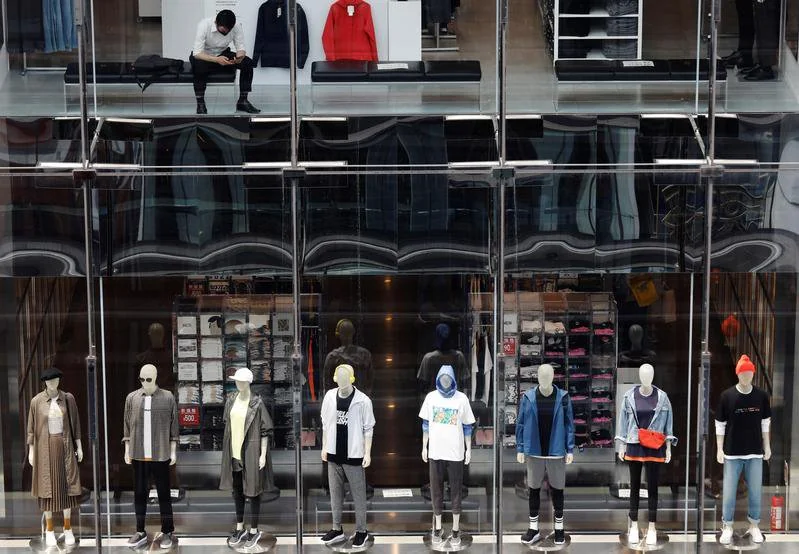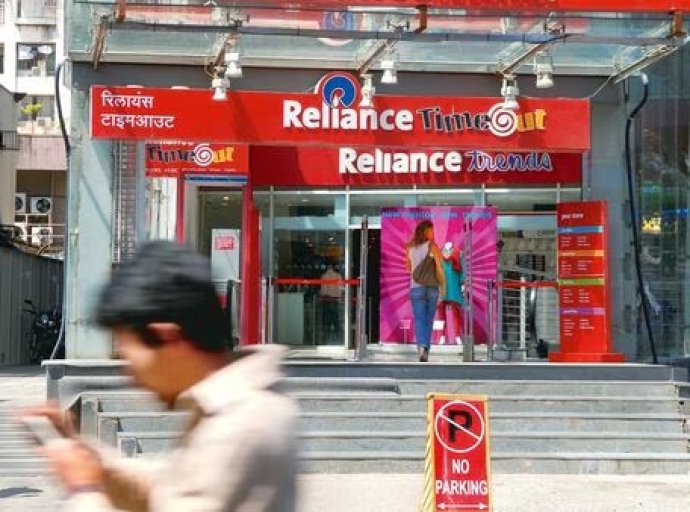In fourth quarter ending March 31, 2024, Cantabil Retail India achieved a 9 per cent Y-o-Y rise in profit after tax (PAT) to Rs 18.35 crore and 12 per cent Y-o-Y rise in revenue to Rs 194.12 crore.
For the entire fiscal year ending March 31, 2024, Cantabil reported a revenue growth of 12 per cent, reaching Rs 616.49 crore, and a PAT of Rs 62.22 crore.
The company is aggressively expanding its market presence across India, both offline and online. As part of its robust retail strategy, Cantabil opened a net total of 86 new exclusive retail stores during the financial year 2023-24. These new stores are spread across various states, including Assam, Bihar, Gujarat, Haryana, Himachal Pradesh, Jammu & Kashmir, Madhya Pradesh, Maharashtra, Punjab, Rajasthan, Uttar Pradesh, Uttarakhand, West Bengal, and Nagaland. With a total of 533 stores, Cantabil plans to further extend its reach across India in the current year.
Vijay Bansal, Chairman and Managing Director, Cantabil Retail India, states, Delivering another quarter of resilient performance, Cantabil underscores its strong operating fundamentals despite a challenging environment and significant slowdown in discretionary spending. The brand has also raised Rs 50.4 crore from marquee investors in Q4 FY24, which will help it capitalise on growth opportunities. The first quarter of FY25 has shown a strong demand uptick despite lower wedding demand, and it expects discretionary spending to improve with the anticipation of a normal monsoon.
Highlighting the company’s expansion efforts, Bansal says, the brand accelerated its store expansion strategy by opening 86 stores this year. The brand remains committed to its long-term strategic agenda of expanding reach, to be more accessible and convenient for customers, reinforcing the brand promise, entering new markets, diversifying across various segments and categories, and ensuring an elevated shopping experience for its customers.
All Stories
A new report by Knight Frank India, ‘Think India Think Retail 2024’, reveals high streets in the country are doing rather well despite new malls popping up across cities. The report highlights a significant shift in consumer preferences, with high streets emerging as strong contenders against the dominance of shopping malls.
High street growth outpaces malls
The report indicates high street retail is witnessing an increase, outpacing the expansion of shopping malls. This can be attributed to several factors:
Experience-driven shopping: Consumers are increasingly seeking a more experiential shopping experience. High streets offer a vibrant atmosphere, a sense of community, and the convenience of browsing through stores located close together.
Lower rental costs: Compared to malls, high streets typically have lower rental costs, making them attractive for both established brands and new entrants. This affordability allows for greater diversity in the retail mix.
Accessibility and visibility: High streets are often located in well-connected areas with high foot traffic. This provides greater visibility for brands and allows for easier customer access.
Community connect: High streets often have a strong local character, fostering a sense of community and attracting residents who prefer a familiar shopping environment.
City-wise growth
The report reveals a variation in high street penetration across Indian cities.
Bangalore leads the pack with MG Road, Commercial Street, Brigade Road, and Church Street featuring in the top 10 high streets nationally. Other prominent cities include Hyderabad, Mumbai, and Delhi with Somajiguda, Linking Road, and Khan Market respectively. The report doesn't explicitly mention saturated cities, but it highlights that established high streets may not see the same rental growth as emerging ones. This suggests that newer areas with development potential are attracting investor interest.
Shifting retail landscape
The report also showcases a growing trend in the composition of high street retail. While traditional stores still hold a significant presence, there's a clear rise in non-traditional (organized/modern) retail formats:
The expansion of organized retail chains on high streets is driven by factors like standardized product offerings, efficient operations, and strong brand recognition. Investments in infrastructure, like better pedestrian walkways and parking facilities, make high streets more attractive for organized retailers. The entry of established brands and organized retail chains brings a wider product range and a more standardized shopping experience to high streets. These factors provide a compelling alternative to traditional stores for a growing segment of consumers. Moreover consumers today are more brand conscious and value the convenience and wider selection offered by organized retail stores.
Fashion dominates high street retail
The report identifies fashion/apparel as a major share of high street retail, catering to a large segment of consumer demand. This dominance is likely due to the visibility factor as high street locations offer excellent visibility for fashion brands, attracting customers with storefront displays and window shopping opportunities. Also, impulse purchases happen on highstreets. The open and walkable nature of high streets encourages impulse purchases, which benefit fashion retailers relying on trendy items. Moreover high streets offer a mix of established fashion brands, local boutiques, and budget-friendly options, appealing to a wider customer base.
The Knight Frank India report underscores a significant shift in the Indian retail landscape. With their focus on experience, affordability, and accessibility, high streets are poised for continued growth, offering a dynamic and evolving platform for retailers and consumers alike.
Indian fashion retail sector is experiencing a dynamic shift, driven by a growing young population and rising disposable incomes and increasing internet penetration. A recent report by Knight Frank India, ‘Think India Think Retail 2024’, sheds light on this transformation.
A balance between malls vs. high street
The report suggests a growing parity between malls and high streets for fashion apparel. While malls continue to dominate in metros due to a concentration of brands and a premium shopping experience, high streets are gaining traction, particularly in non-metros. Driven by factors like affordability; high streets offer a wider range of rental options, attracting a diverse mix of brands, including budget-friendly ones. Another factor for high streets is convenience, as they cater to local demand, offering a more convenient shopping experience for residents. Low rental is another plus. High-street spaces tend to have lower rents compared to mall space, allowing brands to offer competitive pricing. Moreover, consumers increasingly seek a more curated shopping experience, which high-street stores with a focus on specific brands or aesthetics can cater to.
Organized vs. traditional retail
Indeed, organized retail, with branded stores and large departmental chains, is witnessing significant growth. The report highlights this dominance due to consumers increasingly seeking the assurance and standardized quality offered by organized retailers. Organized stores provide a curated selection of apparel, catering to various styles and budgets. And modern stores offer a more pleasant shopping environment with amenities like trial rooms and well-trained staff. Also organized retail leverages marketing and promotional strategies to attract customers.
However, traditional retail, characterized by family-run stores and neighborhood shops, remains a significant player, especially in smaller towns and cities. Their deep understanding of local preferences and personalized service allow them to compete effectively.
Non-metros show strong growth
While metros continue to be major fashion retail hubs, non-metro cities are witnessing significant growth. This can be attributed to rising disposable income in Tier II, III cities that allow residents to spend more on apparel. Rapid urbanization leads to the development of shopping malls and high-street stores in these regions. And fashion brands are recognizing the potential in non-metro markets and expanding their reach. Non-metros offer a larger market base for retailers to capture compared to saturated metro markets.
Despite this growth, metros continue to be major hubs with its higher consumer base. Metros have a larger pool of potential customers, attracting a wider variety of brands. Their stronger retail infrastructure with established shopping malls and high streets, provide ready platform for retailers.
Luxury vs. premium vs. value, a market for all
The report suggests a growing demand across all segments. While the value segment remains the largest due to its affordability and caters to a vast section of the population. Premium segment is witnessing significant growth, driven by increased brand awareness and a desire for aspirational products. The luxury segment caters to a niche market but is experiencing steady growth due to India's growing affluent class. Consumers are becoming more brand-conscious and willing to invest in premium products.
Women’s wear currently holds the largest market share in fashion retail. This can be attributed to growing numbers in workforce. Their increased participation in the workforce leads to a higher disposable income for this segment. And the ever-changing landscape of women's fashion keeps demand high. Kidswear too is growing driven by parents increasingly willing to spend on quality clothing for their children. And growing brand awareness among young parents is leading to a demand for branded kidswear.
Overall, the Indian fashion retail sector is undergoing a significant transformation. High-street stores, organized retail, non-metro markets, and the premium segment are all showing promising growth. While traditional models and value segments remain important, the future of Indian fashion retail lies in a dynamic and evolving landscape.
While e-commerce is booming in India, for apparel, physical stores remain the undisputed king. A recent LocalCircles study suggests a growing interest in online apparel purchases almost 40 per cent shop online and offline, however, physical stores remain the undisputed leader with 81 per cent still preferring to shop in stores. So, how is fashion e-commerce shaping up in India, and how does it compare to global trends?
E-commerce growing but still lags behind
India's e-commerce sector is undeniably booming, with IBEF projecting a market size of $350 billion by 2030. However, apparel seems to be lagging behind other product categories. As the LocalCircles study reveals only 4 per cent rely solely on online apparel purchases. This can be attributed to the importance of the ‘touch-and-feel’ factor, as highlighted by 81 per cent of respondents preferring physical stores.
E-commerce growth in India is pushed by increasing internet penetration, smartphone adoption, and a young, tech-savvy population. However, compared to the US or China, where online apparel sales dominate, India's e-commerce journey in apparel is just beginning.
Apparel vs other categories, a tactile disconnect
Unlike electronics or books, where online purchases are hassle-free, apparel presents a unique challenge. The ‘touch-and-feel’ factor is crucial for Indian consumers, as evidenced by the LocalCircles study. This is further supported by a report by Assocham and Deloitte which highlights that trust in size charts and return policies remains a hurdle for online apparel purchases. While in electronics or groceries, online reviews and detailed descriptions suffice, apparel relies heavily on trying clothes on for fit and feel. This creates a hurdle for online retailers, despite the convenience and discounts they offer.
While various studies project an increase in online apparel sales, the practical growth might be slower. The LocalCircles study suggests a preference for offline shopping even after the pandemic-driven online surge. The study reveals that only 4 per cent of households rely solely on online platforms. This highlights the importance of physical stores for the Indian apparel market.
In fact, compared to western markets like the US and Europe, where online apparel sales flourish, India lags behind. China, on the other hand, offers a closer comparison. Similar to India, a significant portion of Chinese consumers prefer physical stores for apparel purchases due to the importance of fit and quality says McKinsey report on China's Apparel Market.
Stronger online presence in apparel shopping in the West and China can be attributed to factors like higher internet penetration, a culture of online trust, and established return policies. However, even in these markets, physical stores haven't vanished. Many major retailers offer seamless omnichannel experiences, integrating online and offline shopping.
Reasons for India's offline preference
Several factors contribute to India's unique shopping landscape:
Cultural preference for physical stores: The social aspect of shopping, bargaining at local markets, and the importance of immediate gratification all favor physical stores. Also, the ability to try clothes before buying is deeply ingrained in Indian shopping habits.
Limited trust in online retailers: Concerns about product quality, sizing issues, and return hassles can deter online purchases, especially for high-involvement purchases like apparel.
Logistics and infrastructure challenges: Cash-on-delivery remains popular, and reliable delivery networks, especially in smaller towns, are still evolving. A robust and efficient delivery network is crucial for online apparel sales. However, India's vast geography and underdeveloped infrastructure pose challenges for e-commerce companies.
Road ahead
Indeed the future of Indian apparel shopping lies in a harmonious blend of online and offline experiences. Retailers need to offer seamless omnichannel experiences. Click-and-collect options, easy online returns accepted in stores, and robust virtual try-on technology can bridge the online-offline gap.
They also need to build trust and transparency. Clear sizing charts, detailed product descriptions, and hassle-free return policies are crucial to win over online shoppers.
Leverage technology for a personalized touch. Recommender systems and AI-powered styling suggestions can enhance the online shopping experience.
India's apparel market is at a crossroads. While e-commerce holds immense potential, physical stores remain a dominant force. Understanding the reasons behind this preference and adapting to the evolving consumer landscape will be key for retailers to thrive in this dynamic market.
The Q4 net loss of value fashion retailer V-Mart Retail widened to Rs 39 crore from Rs 37 crore recorded in the corresponding quarter last year.
Despite the loss, the company’s revenue for the quarter increased by 13 per centto Rs 669 crore from Rs 594 crore in the corresponding quarter of the previous fiscal year.
For the full financial year 2024, V-Mart reported a net loss of Rs 97 crore on a revenue of Rs 2,786 crore.
The same store sales grew by 6 per cent Y-o-Y for the quarter, driven by better footfall growth during the festive and wedding seasons. The company remains focused on its store expansion plan, having opened 46 new stores in FY24 while closing 25 underperforming ones, bringing the total number of stores across India to 444 by the year-end.
Founded in 2002, V-Mart Retail is an omni retail store chain offering fashion apparel, footwear, home furnishings, general merchandise, and kirana.
Praveen Khandelwal, Secretary General, Confederation of All India Traders (CAIT), has voiced concerns over the alleged circumvention of rules and unethical practices by foreign e-commerce giants like Amazon and Flipkart in their bid to dominate the Indian market.
Reacting to a recent media report suggesting irregularities in the Competition Commission of India's probe into these companies' dealings with mobile manufacturers, Khandelwal emphasised the detrimental impact of this alleged collusion on the country's interests.
Highlighting a pattern of disregard for regulations, Khandelwal underscored the purported collaboration between e-commerce giants and mobile companies, which, he argues, poses a threat to the livelihoods of small traders and undermines broader economic interests. Earlier this year, CAIT had urged the CCI to address anti-competitive practices in the case involving Amazon and Flipkart, stressing the urgent need to safeguard the interests of retailers and their families.
In a letter to the CCI, CAIT urged the regulator to prioritise the investigation and impose penalties on Amazon and Flipkart to halt their alleged illegal activities. The traders' body accused the foreign entities of monopolising mobile phone sales through exclusive launches, thereby harming fair competition in the market.
Khandelwal emphasised the necessity of swift action against these companies and pledged to advocate for the issue's resolution if elected as an MP after the general elections. The allegations underscore growing concerns about the practices of foreign e-commerce players and the need for stringent regulatory measures to ensure fair competition and protect the interests of domestic traders.
Reliance Retail Ventures Ltd (RRVL) reported an 11.7 per cent increase in net profit during Q4 FY24 as compared to corresponding quarter in the previous year.
The company’s growth was attributed to the robust performance of the company’s consumer electronics and fashion & lifestyle segments.
During the fourth quarter, FY24 ended Mar 31, RRVL’s net profit increased to Rs 2,698 crore from Rs 2,415 crore a year ago. Its gross revenue also increased by 10.6 per cent during the quarter to Rs 76,627 crore from Rs 69,267 crore.
Isha M. Ambani, Executive Director, Reliance Retail Ventures, emphasised on the company's commitment to enhance customer value proposition and meet evolving consumer needs through continued investment and innovation across various formats and products.
The retail business of the company registered a notable 28.5 percent increase in earnings before interest, taxes, depreciation, and amortization (EBITDA) to Rs 23,040 crore for the fiscal year ended March 31. Additionally, the EBITDA margin on net sales improved by 60 basis points to 8.4 per cent from the previous year.
During the quarter, RRVL expanded its retail footprint by 7.8 million sq ft. It opened 562 new stores with footfalls in the company’s stores rising by 24.2 per cent to over 272 million visitors, compared to the previous year.
In the fashion & lifestyle segment, RRVL expanded its offerings with new formats such as Azorte, Yousta, and Gap, while its in-house brands achieved over Rs 2,000 crore in annual sales. The Ajio platform enhanced its offerings and customer experience, attracting significant traffic and new customers through events like 'All-Star Sales.' Premium brands recorded a 20 per cent year-on-year growth, while Ajio Luxe exhibited steady performance with a 44 per cent increase in options.
Marking the beginning of its ambitious plan to open 300 outlets over the next three years, fashion brand Beyoung has inaugurated its maiden store in Bhilwara, Rajasthan. Previously, dominating the the online market in Tier II-IV cities, the brand aims to enhance its omnichannel presence by expanding both online and offline. The brand offers offer quality products in more locations and plans to introduce additional categories in the coming year, states Shivam Soni, Founder.
Founded in 2018 in Udaipur, Rajasthan, Beyoung currently boasts a GMV of Rs 200 crore and aims to achieve Rs 650 crore GMV within the next three years. India, the world’s second-most populous country, presents a lucrative market for apparel brands, with a growing number of young consumers adopting western-style clothing. Notably, brands like H&M and Puma generate over 40-50 per cent of their revenues online, highlighting the increasing preference for e-commerce post-pandemic.
The fashion and lifestyle e-commerce market in India is projected to reach $35-40 billion by 2027, with the direct-to-consumer (D2C) segment alone representing an addressable market of $15-20 billion. As D2C brands evolve and expand, integrating online and offline channels becomes crucial for enhancing consumer engagement and market reach.
A leading fashion, beauty, and lifestyle destination in India, Myntra has released the inaugural edition of the 'Myntra Trend Index', a comprehensive report spotlighting the latest fashion trends observed among its millions of customers in the fiscal year 2024.
The report delves into the fashion preferences of consumers, highlighting significant shifts in fashion, beauty, and lifestyle choices.
One notable aspect of the report is the overwhelming embrace of Myntra by consumers, with a remarkable 75 million trend seekers joining the platform in the past year, with 65 per cent hailing from non-metro areas, demonstrating the widespread appeal of fashion across the country.
Emphasising the insights provided by the report, Sharon Pais, Chief Business Officer, Myntra, indicates a noticeable shift towards premiumisation and an increasing adoption of diverse fashion and beauty trends across different consumer segments.
The report reveals intriguing findings regarding color preferences, with men favoring shades like white, grey, teal, and olive, while women leaned towards ethereal pastel hues such as beige, peach, and lavender. Classic colors like black and blue maintain their timeless appeal across various demographics.
GenZ emerged as a significant influencer of fashion trends during the year, with preferences ranging from varsity jackets to bling dresses. Traditional attire underwent modern transformations, with monochromatic lehengas and metallic sarees gaining popularity, alongside a surge in demand for Bollywood-inspired looks.
Accessories played a pivotal role in completing fashion ensembles, with vintage-inspired watches and monogram bags adding a touch of sophistication.
Men embraced trend-first fashion, with crochet shirts and bold graphic tees making statements. Comfort remained a priority, reflected in the demand for oversized t-shirts and baggy cargos.
The beauty and grooming landscape witnessed a notable transformation, with a focus on science-backed skincare and meticulous hair care routines, particularly in non-metro regions.
The report also highlights the unique fashion identities of different cities, with Delhi earning the title of 'Jeans Capital', Kolkata as 'the Kurta Capital', Pune leading in T-shirt purchases, and Bengaluru emerging as the 'Dress Capital'.
Millennials and Gen-Zs showcased their distinct fashion preferences, with smart polos and fusion co-ords gaining traction among the former, and hypergraphic oversized T-shirts and denim corsets capturing the attention of the latter.
Overall, the 'Myntra Trend Index' provided valuable insights into the dynamic fashion landscape of India, underscoring Myntra's role as a premier destination for fashion, beauty, and lifestyle enthusiasts across the country.
While online apparel shopping witnessed a rise during the pandemic, physical stores and markets continue to be the preferred choice for a majority of Indian consumers, according to a new study by LocalCircles.
Online gains traction, but in-store try-on reigns supreme
The report, titled "How India Buys Apparel," surveyed over 35,000 consumers across the country and revealed that only 4% of households exclusively use online platforms for clothing purchases. In contrast, nearly half (47%) prefer to shop in stores, citing the ability to try clothes on before buying (81%) as the main reason. This aligns with findings from a separate report, "Apparel Consumption Trends in India," which emphasizes the importance of the "touch, feel, and try" experience for Indian consumers.
Seamless experiences key in evolving market
The LocalCircles study highlights the importance for retailers to cater to both online and offline preferences. While online platforms offer convenience and discounts, as cited by 40% of respondents who shop both online and offline, physical stores provide a tactile shopping experience with easier returns and instant gratification. This shift in consumer behaviour underscores the need for retailers to provide a seamless and enjoyable shopping experience across all channels.
Thriving industry demands adaptability
The domestic textile and apparel industry contributes nearly 2% to India's GDP and is poised for further growth, according to the "Apparel Consumption Trends in India" report. It forecasts the total Indian apparel consumption expenditure to reach Rs 9.35 lakh crores or $105.5 billion in 2024. This dynamic market demands adaptability from retailers. By understanding and addressing the key factors that influence consumer buying decisions, such as convenience, price, and ability to try on clothes, retailers can better serve their customers and drive growth.
To forge deeper connections with shoppers in Hyderabad, multi-brand fashion and accessories business Azorte has opened a new store in the Aparna Neo Mall, Nallagandla. The store caters to the needs of all men, women, and children.
A retailer of clothing labels such as Svrnaa, Altheory and Outryt, Azorte has allotted different segments in its stores for each brand. The store also features the brand’s recently launched curated collection of summer wedding attire known as the ’ Festive Edit,’ The collection features a wide range of ethnic style designs.
In 2024, Azorte opened a number of new stores including in New Delhi’s Vegas Mall and in Bengaluru’s Phoenix Mall Of Asia. The brand also has a number of stores in cities including Mumbai, Thane, Gurugram, Pune, and Ahmedabad.
Launched in 2022 by Reliance Retail, Azorte offers a wide range of apparels and accessories for the entire family. The store offers western wear by mid-segment brands in the market.
Powerlook, the distinguished men’s fashion brand, proudly opens its seventh store at Phoenix Mall, Viman Nagar, Pune, marking a significant milestone in its ambitious growth plan to establish 50 outlets nationwide by 2027.
With existing strongholds in prominent areas like Bandra West and Thane, the brand aims to cater to India's fashion-forward youth, expanding into cities such as Bangalore, Hyderabad, and Ahmedabad.
Co-founder Raghav Pawar expressed excitement about the Pune flagship's launch, emphasizing Powerlook's dedication to nationwide expansion. The Indian menswear market, projected to reach Rs 330,000 crores by 2028, is experiencing a surge, driven by the youth's increasing demand for smart fashion.
The debut of the Pune store was met with overwhelming success, with over 50 per cent of its stock sold on the first day. Attended by influencers and esteemed guests like Danny Pandit, the grand opening attracted over 1000 customers, reaffirming Powerlook's popularity among the youth.
Co-founder Amar Pawar highlighted Powerlook's commitment to offering trendsetting apparel that resonates with the youth's style preferences.
India's retail sector is bouncing back! A survey by the Retailers Association of India (RAI) shows an 8 per cent sales increase in March 2024 compared to March 2023.
This suggests a recovering market, driven by increased spending on apparel and sporting goods. While jewelry sales dipped slightly due to rising gold prices, categories like consumer durables and IT are expected to pick up soon.
Sanguine about the near-term future
The upcoming 2024 elections are fueling optimism. Historically, elections boost economic activity, and the RAI anticipates a similar trend with higher spending across regions and categories, especially FMCG and consumer durables.
The retail-pie
Regionally, South India leads with a 9 per cent sales rise, followed by West (8 per cent), North (7 per cent), and East India (6 per cent).
In terms of products, sporting goods saw the highest growth (11 per cent), followed by apparel and beauty (10 per cent each).
Adding to the positive outlook, retail chains are resuming expansion plans across the country.





































